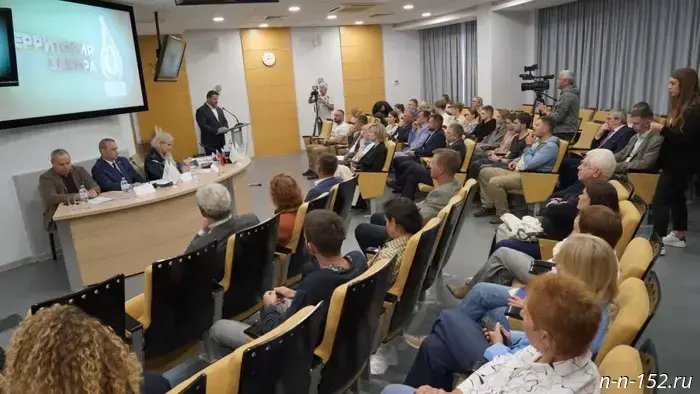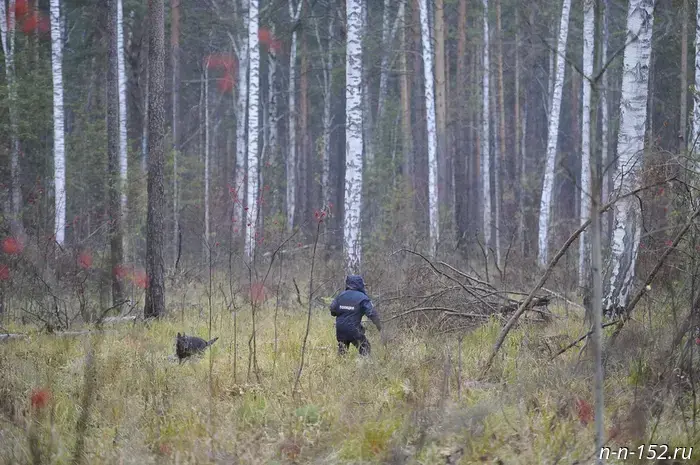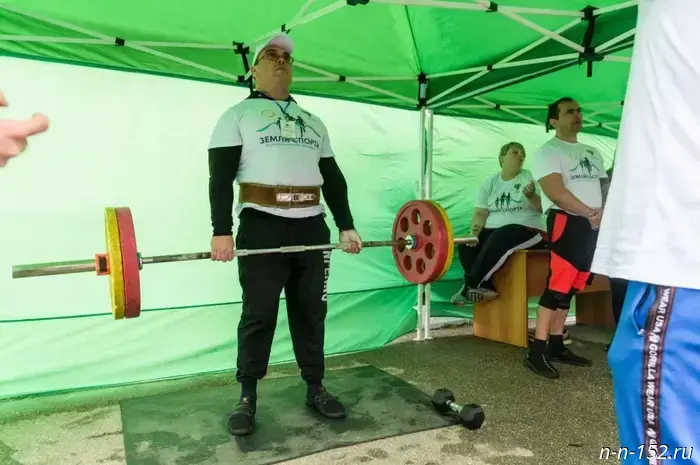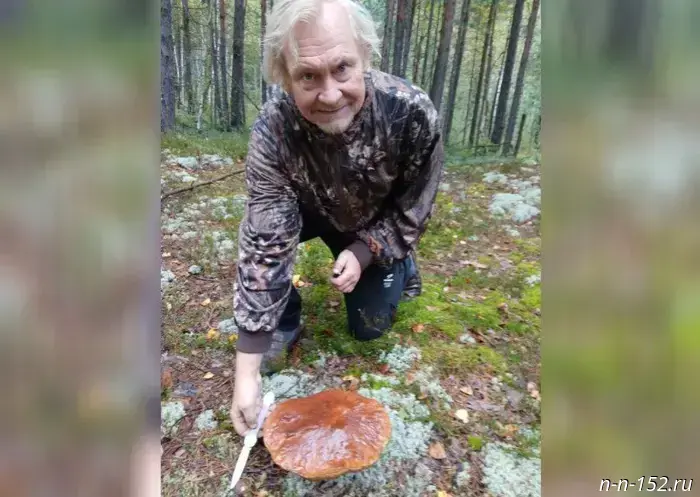
"Green Bridge" between Russia and Belarus: environmental education without borders was discussed in Nizhny Novgorod
04 September 2025 15:35
[130]
Politics — An international conference “Green Bridge: Environmental Education Without Borders” was held in Nizhny Novgorod, becoming one of the key events in the opening program of the IX International Environmental Telefestival “Territory of Tomorrow.” The venue brought together media experts from Russia and Belarus for a dialogue on the future of environmental education and outreach.
Participants included State Duma deputy of the Federal Assembly of the Russian Federation and member of the Energy Committee Yuri Stankevich; Minister of International and Interregional Relations of Nizhny Novgorod Region Olga Guseva; Consul General of the Republic of Belarus in Nizhny Novgorod Oleg Shvets; Chairman of the Committee on Ecology and Nature Management of the Legislative Assembly of Nizhny Novgorod Region Vladislav Atmakhov; Deputy Minister of Internal, Regional and Municipal Policy Alexey Generalov; environmentalists, public figures, media professionals and representatives of “green” cinema, as well as guests from the Republic of Belarus.
Conference participants discussed various aspects of environmental education, including the role of media and the arts in shaping environmental culture, as well as opportunities for cooperation between regions of the Russian Federation and other countries to achieve shared environmental protection goals.
“Russia and Belarus are united not only by historical and cultural ties, but also by a shared responsibility for the future of our peoples. Joint work in the field of ecology, exchange of experience and implementation of large-scale environmental protection projects — all this strengthens the fraternal bonds between our countries. I am convinced that only by joining forces can we preserve natural wealth for future generations and create a sustainable, environmentally oriented future. Nature does not recognize state borders — air, water and climate are the common heritage of all humanity. That is why projects like ‘Territory of Tomorrow’ are of particular importance: they not only help preserve our fragile planet, but also serve as a bridge of mutual understanding between countries,” said State Duma deputy Yuri Stankevich. The importance of developing Russian-Belarusian cooperation was also emphasized by Olga Guseva, Minister of International and Interregional Relations of Nizhny Novgorod Region.
“Holding the IX International Environmental Telefestival ‘Territory of Tomorrow’ under the aegis of Russian-Belarusian cooperation in the field of environmental education reflects the strong ties that Nizhny Novgorod Region is building with the Republic of Belarus. Agreements with five Belarusian regions, 43 contractual documents with municipalities and 27 twin towns — all this testifies to the depth and multifaceted nature of our interaction, aimed at various areas including environmental protection and sustainable development. After the XII Forum of Regions of Russia and Belarus in Nizhny Novgorod we see how our ties are strengthening, and Belarus’s active participation in the ‘Territory of Tomorrow’ telefestival elevates the environmental agenda to a new level, reinforcing our strategic partnership,” stressed Olga Guseva.
Another important topic at the conference was the need to introduce systemic environmental education in schools. As Vladislav Atmakhov, Chairman of the Committee on Ecology of the regional Legislative Assembly, noted, there is not yet a separate subject called “ecology,” and this niche is being filled by public initiatives, inspired in part by the Belarusian experience of “green classes.”
Editor-in-chief of the publication Ecology of Russia and member of the State Council of the Russian Federation’s Commission on Environmental Well-being Olga Strelkova raised the issue of environmental diplomacy. In her view, it is citizen science and joint environmental projects that create the socio-cultural aspect necessary for developing the concept of environmental well-being.
“Perhaps the data provided by the public do not have a high degree of reliability on certain environmental issues, but the growing role of society in environmental management and humane values is evident in all countries. It is citizen science today that provides the socio-cultural aspect needed in the formation and implementation of the concept of environmental well-being,” Olga Strelkova shared.
Svetlana Vasilyeva, director of the ‘Territory of Tomorrow’ telefestival and moderator of the conference, outlined the role of media and cinema as a universal language capable of building ‘bridges’ between countries and cultures.
“In an era of global environmental challenges, when only the united efforts of humanity can change the situation, tools that can erase borders between countries, cultures and generations are especially valuable. Environmental education becomes such a universal language — a language understandable and close to everyone. For nine years now, the international telefestival ‘Territory of Tomorrow’ has served as a platform where filmmakers, journalists, documentarians and activists from around the world speak this language — the language of preserving our planet. Through film and media we build bridges of mutual understanding and cooperation,” Svetlana Vasilyeva concluded.
The NIA “Nizhny Novgorod” has a Telegram channel. Subscribe to stay informed about the main events, exclusive materials and breaking news. Copyright © 1999—2025 NIA “Nizhny Novgorod.” When republishing, a hyperlink to NIA “Nizhny Novgorod” is mandatory. This resource may contain 18+ materials.
Другие Новости Нижнего (Н-Н-152)
 211 people went missing in Nizhny Novgorod Oblast in August.
Two of them were found dead
211 people went missing in Nizhny Novgorod Oblast in August. 04.09.2025. Komsomolskaya Pravda. Nizhny Novgorod Oblast. Nizhny Novgorod.
211 people went missing in Nizhny Novgorod Oblast in August.
Two of them were found dead
211 people went missing in Nizhny Novgorod Oblast in August. 04.09.2025. Komsomolskaya Pravda. Nizhny Novgorod Oblast. Nizhny Novgorod.
 Nizhny Novgorod residents will take part in the final of the All-Russian Sports and Healthy-Lifestyle Marathon "Land of Sport".
Nizhny Novgorod News
Nizhny Novgorod residents will take part in the final of the All-Russian Sports and Healthy-Lifestyle Marathon "Land of Sport".
Nizhny Novgorod News
 Nizhny Novgorod residents did not recognize former mayor Vadim Bulavinov in a photograph with a mushroom.
Photo: VKontakte / Vadim Bulavinov
Residents of Nizhny Novgorod did not recognize the former city head, Vadim Bulavinov, in photographs with a mushroom that he posted on his social media. September 4, 2025. Online publication "We Live in Nizhny." Nizhny Novgorod Oblast. Nizhny Novgorod.
Nizhny Novgorod residents did not recognize former mayor Vadim Bulavinov in a photograph with a mushroom.
Photo: VKontakte / Vadim Bulavinov
Residents of Nizhny Novgorod did not recognize the former city head, Vadim Bulavinov, in photographs with a mushroom that he posted on his social media. September 4, 2025. Online publication "We Live in Nizhny." Nizhny Novgorod Oblast. Nizhny Novgorod.
 More than 200 people went missing in Nizhny Novgorod Oblast in August.
Nizhny Novgorod News
More than 200 people went missing in Nizhny Novgorod Oblast in August.
Nizhny Novgorod News
 The Gorky Railway introduced additional stops for commuter trains in Nizhny Novgorod Oblast.
Nizhny Novgorod News
The Gorky Railway introduced additional stops for commuter trains in Nizhny Novgorod Oblast.
Nizhny Novgorod News
"Green Bridge" between Russia and Belarus: environmental education without borders was discussed in Nizhny Novgorod
Nizhny Novgorod News
